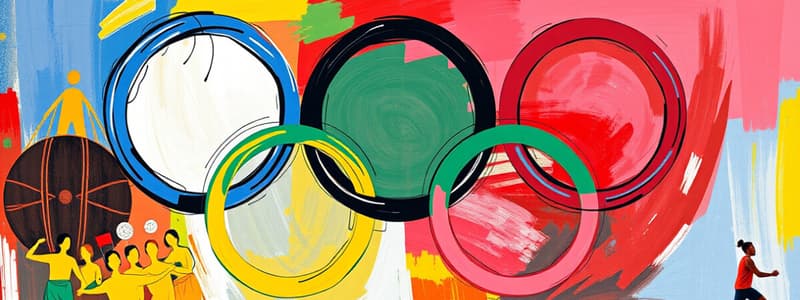Podcast
Questions and Answers
The Ancient Olympics were exclusively for freeborn Greek men and banned women from participating.
The Ancient Olympics were exclusively for freeborn Greek men and banned women from participating.
True (A)
The first modern Olympic Games were held in 1894 in Paris.
The first modern Olympic Games were held in 1894 in Paris.
False (B)
The Summer Olympic Games occur every two years.
The Summer Olympic Games occur every two years.
False (B)
Commercial influence in the Olympics has been a significant factor since the revival of the Games.
Commercial influence in the Olympics has been a significant factor since the revival of the Games.
The 1980 Moscow Games were boycotted by the Soviet Union.
The 1980 Moscow Games were boycotted by the Soviet Union.
Flashcards are hidden until you start studying
Study Notes
Ancient Olympics
- Origin: Began in 776 BC in Olympia, Greece.
- Frequency: Held every four years, known as Olympiads.
- Events: Included running, wrestling, boxing, long jump, discus throw, and chariot racing.
- Participants: Open only to freeborn Greek men; women were prohibited.
- Religious Significance: Dedicated to Zeus; featured sacrifices and rituals.
- Decline: Ended in 393 AD when Emperor Theodosius I banned pagan festivals.
Modern Olympics
- Revival: Initiated by Pierre de Coubertin in 1896; first modern Games held in Athens.
- Frequency: Held every four years, with interruptions for World Wars (1916, 1940, 1944).
- Summer and Winter Games: Summer Games in even years; Winter Games started in 1924.
- Expansion: Grew from 13 nations in 1896 to over 200 nations today.
- Events: Expanded to include diverse sports, including team sports and new disciplines.
- Inclusion: Women allowed to compete starting in 1900; ongoing efforts for gender equality.
Impact of Politics on the Olympics
- Boycotts: Notable boycotts, such as the 1980 Moscow Games (U.S. led) and 1984 Los Angeles Games (Soviet-led).
- Propaganda: Used as a platform for showcasing national strength, e.g., Nazi Germany in the 1936 Berlin Games.
- Diplomatic Tensions: Events often coincide with geopolitical conflicts, affecting participation (e.g., the Cold War).
- Hosting Controversies: Countries may face scrutiny over human rights issues, environmental practices, and political stability (e.g., 2008 Beijing Games).
- Commercialization: Increased involvement of corporations and media, influencing political dynamics and public perception.
Ancient Olympics
- Originated in 776 BC in Olympia, Greece, marking the start of competitive sports.
- Held every four years, referred to as Olympiads, establishing a consistent sporting schedule.
- Featured events such as running, wrestling, boxing, long jump, discus throw, and chariot racing, highlighting diverse athletic skills.
- Exclusive participation for freeborn Greek men; women were entirely barred from competing.
- Religious significance as the Games were dedicated to Zeus, including sacrifices and associated rituals.
- The decline of the Ancient Olympics occurred in 393 AD, following a ban on pagan festivals by Emperor Theodosius I.
Modern Olympics
- Revived by Pierre de Coubertin in 1896, with the first modern Games taking place in Athens, Greece.
- Continuously held every four years, with cancellations during World Wars in 1916, 1940, and 1944.
- The Summer Games take place in even years, while the Winter Games were initiated in 1924.
- Expansion from 13 nations in 1896 to over 200 nations today, showcasing global participation.
- A broad array of events now includes team sports and emerging disciplines, reflecting the evolution of athletic competition.
- Women were allowed to compete starting in 1900, with ongoing efforts promoting gender equality in sports.
Impact of Politics on the Olympics
- Significant boycotts occurred, such as the U.S.-led boycott of the 1980 Moscow Games and the Soviet-led boycott of the 1984 Los Angeles Games, demonstrating political influence on participation.
- The Olympics have served as propaganda platforms to showcase national strength, notably during the 1936 Berlin Games under Nazi Germany.
- Events often coincide with geopolitical conflicts, impacting athlete participation and international relations, particularly during the Cold War.
- Hosting countries face scrutiny over human rights issues, environmental practices, and political stability, exemplified by the controversies surrounding the 2008 Beijing Games.
- The commercialization of the Olympics has grown, with corporations and media involvement affecting political dynamics and shaping public perception of the Games.
Studying That Suits You
Use AI to generate personalized quizzes and flashcards to suit your learning preferences.




